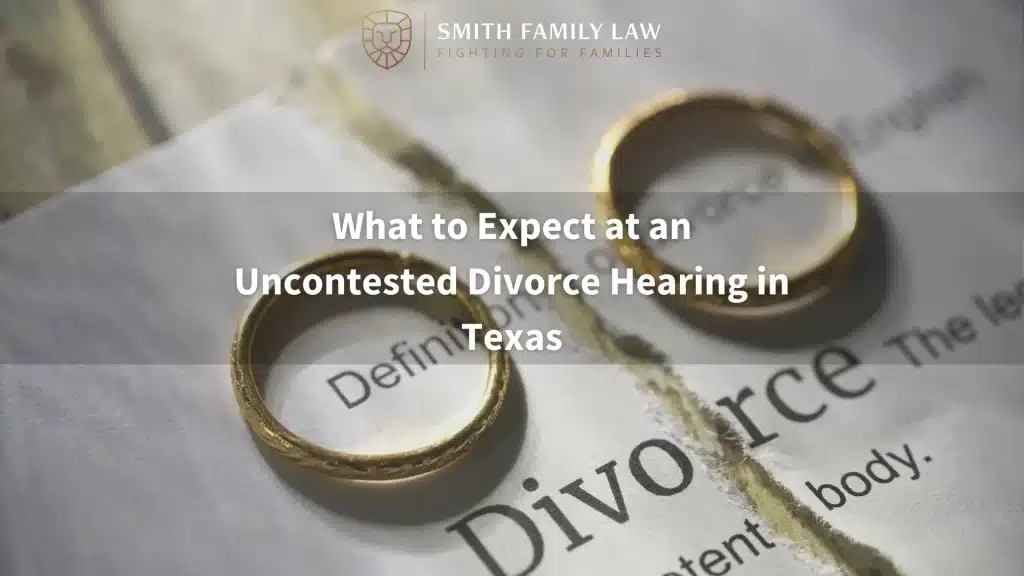
If you and your spouse agree on the terms of your divorce, you might choose an uncontested divorce. This option is often quicker, cheaper, and less stressful than a contested divorce. Here’s what you should know about what happens before, during, and after an uncontested divorce hearing in Texas.
What Happens Before an Uncontested Divorce Hearing?
Both spouses must agree on all divorce-related issues for an uncontested divorce hearing in Texas. Before the hearing can occur, the couple must complete and file a petition for divorce with the appropriate Texas court. Typically, one spouse files the petition, and the other spouse signs a waiver of service, acknowledging that they have received the paperwork. The filing spouse must also provide the court with a completed divorce decree outlining the terms of the agreement.
After filing the necessary paperwork, a mandatory 60-day waiting period begins. Texas law requires this waiting period for all divorces, regardless of the circumstances. During this time, the spouses can finalize their agreement and make any necessary preparations for post-divorce life. If both spouses still agree to the terms of the divorce at the end of the waiting period, they can schedule a divorce hearing.
What Happens During a Hearing in an Uncontested Divorce?
During a hearing in an uncontested divorce in Texas, both spouses appear before a judge. They present the final divorce decree, which outlines their agreements on property division, child custody, child support, and other relevant issues. The judge reviews the decree to make sure it follows Texas laws and seems fair to both parties.
The judge might ask both spouses questions to confirm they understand and agree to everything in the decree. If one spouse can’t attend, they must provide a notarized affidavit stating they agree to the terms. If the judge approves, they sign the decree, finalizing the divorce. Both spouses receive a copy of the signed decree, marking the official end of the marriage.
Types of Questions to Expect During an Uncontested Divorce Hearing
If you’re going through an uncontested divorce in Texas, it’s beneficial to know the questions a judge might ask you during the hearing. A lawyer can help you understand and prepare for the following types of potential questions:
- Have you read and do you fully understand the terms of this divorce decree?
- Are both of you seeking the divorce willingly and not under any coercion?
- Have you disclosed all assets and liabilities to each other?
- How did you decide on the specific terms of the agreement?
- Are both of you satisfied with the proposed child custody and support arrangement?
- Are you both satisfied with the spousal support arrangement?
- Is this your signature on the divorce decree and all attached documents?
- Have you settled all property and financial matters between yourselves?
- Do you believe the agreement is in the best interests of your children?
- Are there any unresolved issues that the court needs to address?
- Do you understand that by submitting this agreement, you waive the right to a future trial?
How Long Does an Uncontested Divorce Hearing Take?
An uncontested divorce hearing in Texas usually takes relatively little time, ranging from a few minutes to half an hour. This is because both parties have agreed on all terms before the hearing. As a result, the judge just needs to review the documents, confirm that both parties understand and agree to the terms, and then finalize the divorce. The process is straightforward and quick compared to contested divorce hearings, which often take much longer due to disputes between the parties.
What Happens After the Final Hearing in an Uncontested Divorce?
After the final hearing or “prove-up” in an uncontested divorce in Texas, the judge signs the divorce decree, making the divorce official. Both parties receive a copy of the signed decree, which proves the marriage has ended and lists the terms both spouses agreed upon.
With the divorce finalized, both individuals are single persons and may remarry if they choose. If the decree specifies child support or alimony payments, the paying spouse must start making these payments as outlined.
Both parties must follow all terms in the divorce decree, and any violations can lead to legal consequences. If either spouse wishes to modify the terms of the divorce decree, they must appear before a court to request the change.
What Happens If One Spouse Does Not Appear for an Uncontested Divorce Hearing?
If one spouse does not appear for an uncontested divorce hearing in Texas, the process can still move forward, but it usually becomes more complicated. The present spouse can ask the court to proceed by showing the judge that the absent spouse received proper notice of the hearing. They can do this with a signed waiver of service from the missing spouse, confirming they knew of the hearing.
If the court accepts the signed waiver of service, the judge can proceed with the hearing using only the testimony of the present spouse. However, if it appears the absent spouse did not receive proper notice or the judge has other concerns, they might reschedule to give both parties a chance to attend.
The Importance of Having an Experienced Divorce Lawyer
An experienced family law attorney is essential, even for an uncontested divorce. Our seasoned team of divorce attorneys understands Texas divorce laws and can help you make informed decisions within the appropriate legal framework. Even if you and your spouse agree on everything, a lawyer from Our Team can spot potential issues in your agreement that you might overlook.
Your lawyer can ensure all your divorce paperwork is correct and filed properly. This could prevent delays or future legal complications stemming from simple mistakes. Your attorney can also answer your questions, protect your rights, and keep you from agreeing to unfair terms. Emotions often run high during a divorce, but a lawyer can provide objective advice and act as a buffer throughout the process.
Contact an Uncontested Divorce Attorney in Texas Now
If you’re considering an uncontested divorce or still have questions about the process, Smith & Bledsoe Family Law is here to help. Contact us today or call (512) 277-3166 for your free consultation and get the guidance you need to move forward with confidence.
Related Reading:
